
Preface
Nearly 17 years after the 9/11 attacks and the subsequent 9/11 Commission Report recommendations, a Telegram cryptocurrency will shatter all the lessons learned about terrorism financing, and will be used to fund terrorism worldwide. The recommendations stated: "Vigorous efforts to track terrorist financing must remain front and center in U.S. counterterrorism efforts. The government has recognized that information about terrorist money helps us to understand their networks, search them out, and disrupt their operations. Intelligence and law enforcement have targeted the relatively small number of financial facilitators – individuals Al-Qaeda relied on for their ability to raise and deliver money – at the core of Al-Qaeda's revenue stream."
As terrorist groups such as the Islamic State (ISIS) have grown more sophisticated and do much of their fundraising online, it has become almost impossible to follow these recommendations. Telegram's introduction of its own cryptocurrency will allow terrorist groups to easily distribute money, raise funds, and so on. The question is: Can anything be done to stop it? The 9/11 commission report detailed how fundraising for the 9/11 attacks relied on imams and mosques, through hawala (an informal trust-based system of transferring funds) and other fairly primitive means. Cryptocurrencies have already made terrorist fundraising more difficult to track, and with Telegram's and Telegram CEO Pavel Durov's history, the problem will increase by orders of magnitude.
Introduction
A white paper "leaked" in early January detailed how the encryption app Telegram aims to join the cryptocurrency craze by adding a "third generation" blockchain with more advanced capabilities than Bitcoin and other existing cryptocurrencies with a mainstream appeal. Pavel Durov, who seeks to raise over a billion dollars for the development of the Telegram Open Network (TON) Blockchain, whose representative cryptocurrency is Gram, and for "the development and maintenance of Telegram Messenger, and other purposes," has already gained the interest of wealthy Internet investors, and has won over many in the leading economic media to his plans.
Following an initial coin offering (ICO), Telegram is on track to raise that billion dollars, reportedly in just four months. As of March 2018, Telegram had taken in $850 million from wealthy venture capital firms, and it reportedly aims to raise another $850 million over the next month and a third $850 million in the round after that, according to documents associated with the offering.[1] Media outlets, including Bloomberg, state that $2.5 billion could be raised. It should be noted that Durov, who, according to Forbes, already has a net worth of $1.7 billion and who created the popular Russian social media platform VK, which is widely used by Russian-speaking jihadis, could see his personal wealth increase dramatically.
Most media reports about the Telegram ICO have either failed to disclose or have downplayed the fact that the Telegram app is the heart and soul of cyber jihad, and is hugely popular with terrorists, particularly with ISIS. Since 2015, when it was used in the November 2015 Paris attacks, it has emerged as jihadis' preferred app for encrypted communications, including planning and carrying out attacks, as arrests worldwide have shown. On March 15, 2018, authorities arrested a Cuban man in Bogotá who had planned to bomb a restaurant frequented by U.S. diplomats and who had on Telegram communicated his desire to blow himself up for the Islamic State. Just last week, on March 23, ISIS used Telegram to claim responsibility for its attack in the southern French town of Trèbes (see image below).

Previously based in Germany and London, and registered as a British company, Telegram has tried "a number of locations." Noting that the company is currently in Dubai, Pavel Durov said on Twitter that "we don't consider it our permanent base," but the company is there until "local regulations change." Durov boasts about moving Telegram from place to place to evade government oversight and restrictions over the past two years, and his tweets have been datelined N.Y., U.K., France, Switzerland, and other locations throughout the world. It should, however, be noted that Telegram has servers throughout the West, including in the U.S.
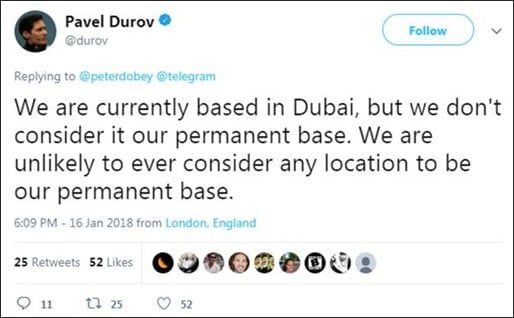
Durov often acts as if he is above the law and deserves immunity from criticism about the terrorists on his platform. Governments worldwide – first the U.S., then the U.K., France, Germany, and others in Europe – have also warned about Telegram as a hub for terrorist planning, recruitment, and daily operations and communications.
Should Telegram launch its own cryptocurrency, it will surely become the go-to financial apparatus for terrorist groups – and at the same time create an impossible situation for counterterrorism officials trying to stop terrorist financing. Were no lessons learned from the 9/11 Commission Report section on terrorist fundraising?
In a possible sign of trouble ahead, mounting concern about bad elements investing in Telegram's cryptocurrency have led the company to take some initial precautions. In mid-March, it was announced that individuals on the sanctions lists of the U.S., U.K., European Union, or United Nations, including Iran, will not be allowed to take part in Telegram Open Network initial coin offerings (ICOs), and will be forbidden by the official Telegram group investor agreement from buying Gram cryptocurrency, according to the Russian news agency RBC. The ban extends to all residents of the Crimean Peninsula, Cuba, Iran, the Democratic People's Republic of Korea, and Syria.
In December 2016, MEMRI released its seminal study Germany-Based Encrypted Messaging App Telegram Emerges As Jihadis' Preferred Communications Platform. A year later, Telegram is even more widely used by terrorist organizations. Adding its own cryptocurrency will further increase both its popularity and its use by terrorists – particularly since Telegram has not even begun to seriously address terrorist use of its platform.
On December 26, 2016, one day after MEMRI exposed Telegram as ISIS's and other jihadis' "app of choice" – as described by The Washington Post on its front page on December 24 – Telegram responded by creating its ISIS Watch channel/bot. In daily updates, the account bot notes the number of ISIS accounts Telegram claims to have removed in the previous 24 hours – a number totaling 5,000-8,500 monthly. But Telegram offers no proof that this actually happens, and as an observer of Telegram and of terrorist groups online, I can attest that many accounts that do disappear soon return.

On January 31, 2017, following reports that Telegram was used in the November 2015 Paris attacks, Durov had the audacity to tweet on the matter of Telegram's procedure for removing terrorist content: "We will look into whether such measures are still necessary in 2018." A recent post on Telegram of "guidelines for doing just terror operations" shows how to lethally stab someone and what kind of knife to use, advising throat slashing.

All of the methods of killing described in this official ISIS video, a screenshot from which is shared on Telegram, are performed on a living person until he dies in front of the camera.
Another post this week on the LM WORLDWIDE (Lone Mujahideen) Telegram Channel included "tips for the mujahideen in the enemies' lands," gives specific instructions on what to do before planning, during planning, and in the implementation of an attack, including "strike violently and try to inflict the greatest losses in the enemy" and "keep killing until you are killed."

The following report explains why a Telegram cryptocurrency is a national security threat, detailing the justified concerns of the U.S. and other Western governments about current terrorist use of Telegram and how and why governments have not been able to successfully pressure the company to tackle it. It will also explain how this is going to change with the coming ICO and how terrorists already freely use Telegram for fundraising. The report will offer recommendations for how the U.S. government and Western companies can finally get Telegram to remove terrorist activity from its platform and what measures should be taken if Telegram does not comply.
Governments Are Concerned About Terrorist Use Of Cryptocurrencies – But May Be Unaware of The Looming International Security Danger Of Telegram Cryptocurrency
As the value of Bitcoin reached new highs earlier in the year and garnered increased media and other attention, there has been heightened concern from governments worldwide that terrorist groups are using digital wallets to send and receive funds using Bitcoin and other cryptocurrencies. At the same time, as ISIS's physical caliphate crumbles, along with its own once-heralded economy that included its own currency and banks, it is naturally turning to cryptocurrencies. In recent months, French, Italian, Australia, Japan, U.K., and other legislatures worldwide have sought more regulations on Bitcoin and other cryptocurrencies because of potential terrorist usage. In the U.S., there have been bipartisan Congressional hearings and legislation on the matter including in January 2018, when Rep. Ted Budd (R-N.C.) introduced H.R.4752, the Financial Technology Innovation and Defense Act, to establish a task force to combat terrorist use of cryptocurrency. These concerned government bodies worldwide may be unaware of the looming international security danger associated with a Telegram cryptocurrency.
Western Governments Have Not Had The Leverage To Pressure Durov – Until Now
Inexplicably, although Telegram is a major highway for the daily activity of ISIS and other terrorist groups, and has been at the center of multiple terrorist cases worldwide, there has been no significant pressure on Telegram to remove terrorist content. Reasons for the lack of pressure could be that the location of Telegram's headquarters is not available, and Durov's international movements, and those of the company's assets, make it difficult to compel the company to tackle its terrorism problem. The new official cryptocurrency changes all that. As other social media companies, led by Facebook, make tremendous efforts to fight terrorist content online, Durov remains defiant about his platform's popularity among terrorists worldwide, and his responses to accusations are filled with half-truths and snark.
Despite Durov's unsubstantiated claims that Telegram has been removing terrorist content, he has been consistently arrogant in the face of Western government pressure to do so. The day of the March 18, 2017 Orly Airport attack – the same week as the Westminster attack in London – he tweeted that his "new passport photo is strangely suitable for media articles about terrorists using Telegram."
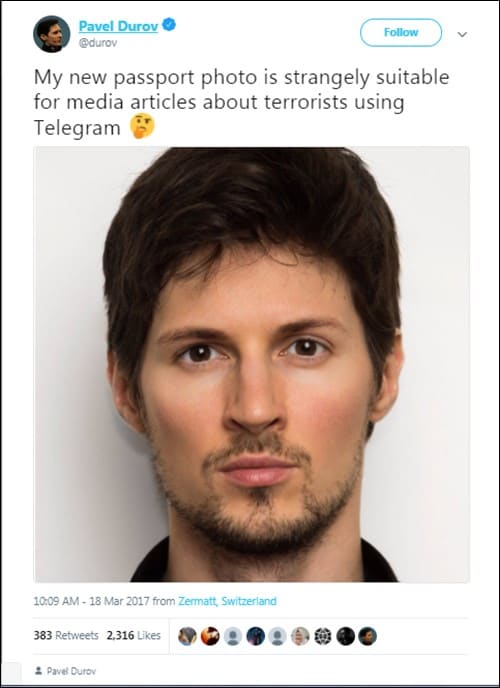
His attitude was best summed up by the Evening Standard's James Ashton: "As governments wrestle with social media's role in tracking criminals and censoring content, Durov has become a divisive figure akin to Julian Assange or Edward Snowden. Telegram was one platform on which Islamic State plotted its [November 2015] attack on the Bataclan [theater in Paris]."

Governments of Western countries, including Germany, France, the U.K., the U.S., and others, have all sounded alarms about terrorists on Telegram. For example, on August 23, 2016, it was reported that France and Germany were pushing for Europe-wide rules requiring the makers of encrypted messaging apps, notably Telegram, to help governments monitor communications among suspected extremists. At a news conference with German Interior Minister Thomas de Maiziere, French Interior Minister Bernard Cazeneuve said that French investigators, armed with a court order, had been unable to even contact "an interlocutor" at Telegram. Durov wrote, in response to a question submitted via his platform about Cazeneuve's statement: "We haven't received any such request and have no idea what the French officials are after. In any case, Telegram Secret Chats and information on them are not logged on our servers." Additionally, Mounir Mahjoubi, president of the National Digital Council, an independent advisory group in France established by French president Nicolas Sarkozy that focuses on privacy issues, said: "There is an issue with Telegram. They have done everything to make it a technological nightmare to find where their server is."
More recently, in her speech at the Davos Forum in January 2018, U.K. Prime Minister Teresa May stated: "Technology companies still need to do more in stepping up to their responsibilities for dealing with harmful and illegal online activity." While big tech companies need to do this, she added, it is also important for small companies to do so as well: "Smaller platforms can quickly become home to criminals and terrorists... We have seen that happen with Telegram. And we need to see more co-operation from smaller platforms like this... We also need cross-industry responses... No one wants to be known as 'the terrorists' platform' or the first-choice app for pedophiles."
Terrorist Fundraising On Telegram
ISIS, Al-Qaeda, and other jihadi groups have been using and experimenting with cryptocurrencies for a few years now, for fundraising and planning attacks, sharing and authoring articles about them, and preparing for when enough terrorist groups and followers become comfortable with them and use them widely to transfer funds and make them a regular part of their terrorist activities – as regular as using social media is today, especially platforms such as Telegram. Terrorist fundraising is already underway on Telegram – as are the dissemination of tips on how to do so, direct requests for funds for purchasing weapons, and more.
Last month, the pro-Al-Qaeda English-language magazine Al-Haqiqa, which is distributed on Telegram, included an article examining the shari'a permissibility of using Bitcoin and similar currencies to fund jihad. It stated: "We see lots of potential for the use of cryptocurrencies for our purposes."
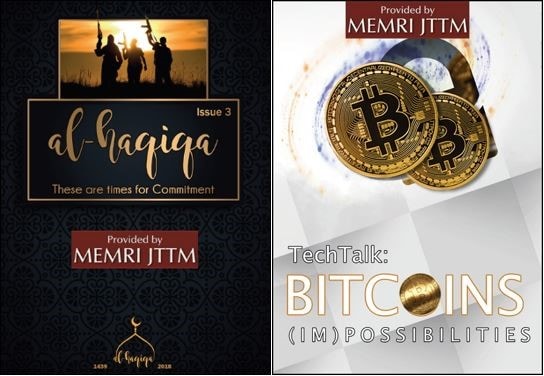
Cover of Al-Haqiqa with article on cryptocurrency.

Al-Haqiqa distribution on Telegram.
The pro-ISIS Ibn Taymiyyah Media Center (ITMC), identified with the Salafi-jihadi stream in the Gaza Strip, has been conducting an online campaign called "Jahezona" ("Equip Us") to raise funds for the Salafi jihad organizations in Gaza since 2015. The campaign, whose motto "The money will come from you and the blood will come from us" calls upon Muslims to donate funds for the Gazan mujahideen, and also to assist by spreading the word about the campaign. It stresses that the mujahideen are in dire need of such aid and that "waging jihad by means of money" (i.e. financially assisting the jihad fighters and their families) is an important religious duty incumbent upon each and every Muslim. The campaign also emphasizes that those donating money for jihad are like those fighting with their own hands, and that the religious texts and scholars "even put this duty before" the duty of waging jihad on the battlefield.
The following are items from the campaign posted this month on the group's Telegram channel devoted to fundraising. The graphic below says that the donated money will be spent on: waging jihad for the sake of Allah; training the mujahideen and equipping them with weapons and ammunition; manufacturing weapons such as rockets, bombs, and IEDs; training the mujahideen and developing their skills; teaching and preaching Islamic education; jihadi media; raising the level of security alertness for the mujahideen and for securing and protecting those on the run; and social services assisting the families of the martyred and imprisoned mujahideen.
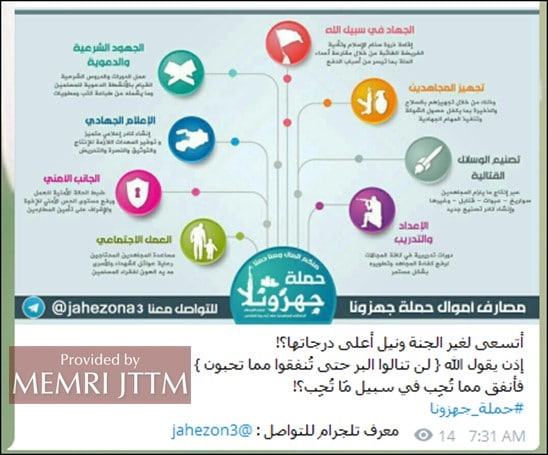

The most important organization to openly use Telegram for fundraising is the Syria-based anti-Assad Al-Sadaqah organization, which promotes itself as itself as "an independent charity organization that is benefiting and providing the Mujahidin in Syria with weapons, financial aid, and other projects relating to Jihad." Its ongoing fundraising campaign on social media, especially on Telegram, is aimed at Americans and other Westerners — and a growing number of them are donating, disseminating its posts, and chatting about how to donate. The campaign shares its Bitcoin wallet number on its Telegram channel, which it opened on November 8, 2017. Its image and video on it has text on the bottom of its pages "Donate anonymously with cryptocurrency."

Images from the Al-Sadaqah Telegram channel.
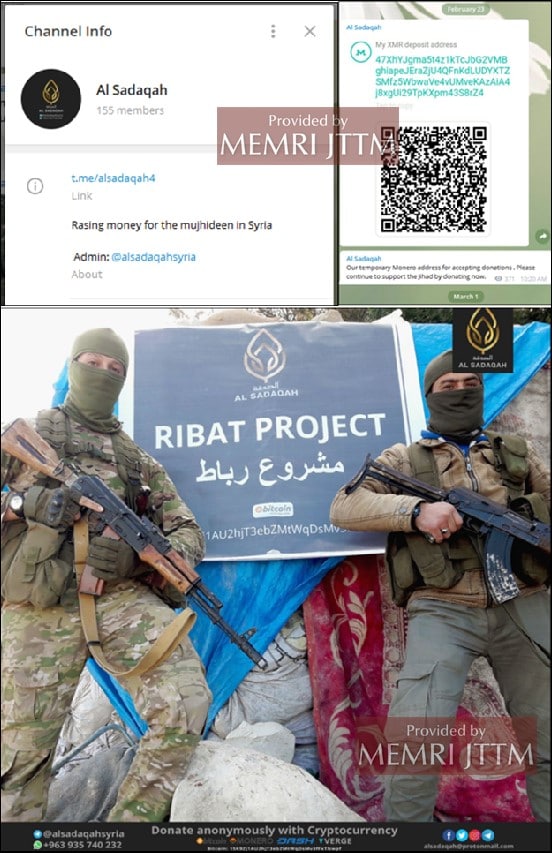
On the pro-Hay'at Tahrir Al-Sham (HTS) Telegram channel "HTS Correspondent" a campaign is underway calling on Muslims to donate money to support the mujahideen waging jihad against the polytheists.[2] The channel also states that preparing a suicide bomber for a mission with a car bomb costs $20,000, while preparing one commando to carry out a deep-strike operation costs $1,500. The list on the right below details more military expenses: preparing a fighter for a storming operation costs $1,000; a mortar shell costs $15; a mortar tube costs $600; an Al-Feel rocket costs $900; a mountain motorbike costs $900; and a pickup truck costs $10,000.[3]

Another of the many examples of fundraising going on right now on Telegram is a call by a well-known pro-ISIS disseminator for Muslims to donate money for ISIS and the caliphate. It states in part: "Donate your wealth to spread and defend the creed and methodology of the Islamic State, to defend the Mujahideen in the battlegrounds, and to defeat unbelief, polytheism, and the filthy rejectionists [Shi'ites]... O monotheists, hasten and make hijrah to the battleground of jihad and the fight to defend Allah's religion and the mujahideen [who are defending] Allah's religion in the Islamic caliphate. If you defend Allah, Allah will grant you victory until you become among those who fight for His sake steadfastly. If you are unable to be in the battlegrounds of jihad for legitimate reasons, be aware that you are still obligated to wage jihad which has levels. One of it is to wage jihadi with your wealth. O you who are not in the battleground of jihad, can’t you spend and give your wealth in the sake of Allah?"

How The Planned Telegram Cryptocurrency Will Work
A promotional video for the Telegram Open Network (TON), posted on YouTube on December 22, 2017, promises that the "fast, scalable, and user-friendly" cryptocurrency and blockchain platform will "revolutionize blockchain technology." All Telegram users, it says – 180 million, with 500,000 more joining every day, and 70 billion messages delivered daily – will get a TON wallet, making it "the world's most adopted cryptocurrency."
"A blockchain Telegram Open Network (TON) and a crypto-currency called Gram will upgrade Telegram from just a messaging service, making it also a payment system that will compete with Visa and MasterCard as a mainstream payment network. The new network aims to include a digital wallet, storage services similar to those of Dropbox Inc., a proxy layer to hide identity, an applications platform, and a payments channel."
"With its ability to handle millions of secure transactions per second" due to its "unique multi-blockchain architecture," all blockchains can quickly exchange data with a "smart routing system." TON, it says, uses "direct payment channels to transfer banking in milliseconds" and can "easily accommodate billions of users." The video concludes: "In 2018, 200 million Telegram users will get access to TON, and its fast-user-friendly cryptocurrency and app platform." (View the video here.)



Over The Past Two Years, MEMRI Has Supported And Provided Research For Efforts To Pressure Durov On Capitol Hill – Now With Telegram's Cryptocurrency, Further Urgent Action Is Needed
Since the summer of 2016, MEMRI has been meeting with government agencies and offices on Capitol Hill on the issue of Telegram being used by terrorist groups worldwide. We observed the platform as a handful of terrorist accounts quickly exploded into thousands, and we sounded the alarm. Shortly thereafter, Telegram was found to be connected to major terrorist attacks.
On December 16, 2016, Rep. Ted Poe, Chairman of the House Subcommittee on Terrorism, Nonproliferation and Trade, and Rep. Brad Sherman, the Committee's Ranking Member, called Durov out in a Congressional letter that included exclusive MEMRI research. MEMRI has worked for years with these two members of Congress on the issue of removing terrorist content from social media platforms, including, most recently and specifically, Telegram.
The letter reads: "We write to communicate our grave concerns about reports regarding the recent migration of Foreign Terrorist Organizations (FTOs) and their supporters from other social media platforms to Telegram. Terrorists are reportedly using Telegram's encrypted service to disseminate propaganda, drive fundraising, recruit new members, and coordinate attacks... It is our hope that Telegram will learn from other social media companies who have successfully maintained their emphasis on privacy while reducing the terrorist footprint on their platforms. They did this by making significant investments over a sustained period of time. These investments included making it easier for users to report terrorist content, having dedicated teams to examine reports and proactively search for terrorist content, using algorithms and other automated mechanisms to assist manual reviews, quickly identifying and removing accounts promoting terrorism, regularly training review teams on what to look for and new ways terrorists are using the platform, and, most recently, coming together to form a shared database of terrorist content." It continued: "[N]o private company should allow its services to be used to promote terrorism and plan out attacks that spill innocent blood."
After noting that "[h]undreds of channels affiliated with ISIS and other terrorist organizations still find refuge in Telegram's encrypted service," it enumerated several examples of this content, and concluded: "We respectfully request that you do all in your power to prevent terrorists from exploiting Telegram to advance [their] lethal cause."

Over the past two years, as other social media companies worked to remove terrorist content, Telegram has become increasingly widely used by terrorists.
Following the recent news about Telegram's ICO for its cryptocurrency, MEMRI is again meeting with the same offices, as well as with new leaders on the Hill, with recommendations to deal with the threat of a Telegram cryptocurrency.
WHAT CAN BE DONE: A SET OF RECOMMENDATIONS FOR FORCING TELEGRAM TO REMOVE JIHADI CONTENT
The following are several steps to effect the removal of jihadi content from Telegram, in order to make sure the platform does not become a fundraising base for terrorists:
Legislature: Relevant panels of Congress can schedule hearings and invite Durov to testify and answer questions, under oath, about Telegram and its policies and practices relating to terrorist-linked content discovered on the platform, and about ensuring that terrorist fundraising will not take place on it. If he refuses, Durov can be subpoenaed and/or Congress can seek ways to penalize his or his company's investments and operations in the U.S. – including but not limited to designating him and/or his company as terrorist entities.
Google And Apple: Since Google's Play Store and Apple's iTunes App Store are the only outlets for downloading the Telegram app, both these companies are in a unique position to pressure Telegram to remove jihadi content. If safeguards against jihadi use of Telegram are not added, then they can be asked to remove the app from their stores. Durov has expressed concern about the possibility of Telegram's removal from the App Store, and is vulnerable to threats in this regard. In February 2018, Telegram was briefly removed from the App Store after it was discovered that child pornography was being disseminated through its platform.[4]
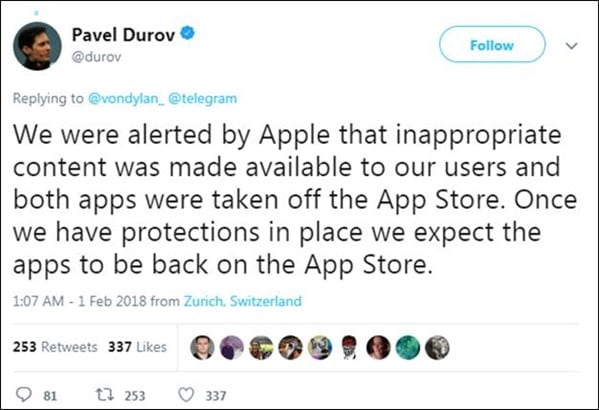
Telegram Servers And Presence In The U.S.: While not much is known about Telegram's presence in the U.S., the company appears to operate at least partly within its borders. On October 13, 2016, Telegram tweeted an announcement stating: "Issues in North and Latin America: cooling system died in one data center, massive overheating. Data safe, working with DC staff to fix." Telegram should be asked to provide details on the locations of its servers in the U.S.
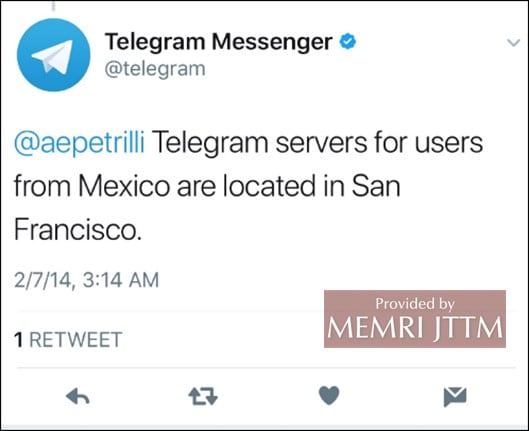
Additionally, Telegram states on its website that its servers are "spread worldwide for security and speed." Since Telegram operates within the U.S., the U.S. government may have legal and regulatory remedies for forcing Telegram to remove terrorist content, including fines or cessation of operations.

According to an October 13, 2016 Telegram tweet, the company has "DC staff" and its servers are "spread worldwide."
Previously Telegram Had No Go-To Contact Address; Now Their Lawyers Have Been Identified – And Should Be Questioned About Their Client: According to reports, the international law firm Skadden, Arps, Slate, Meagher, & Flom represents Telegram.[5] The firm could be notified of this issue, and asked to explain Telegram's policies and practices related to terrorist content on its platform.
Securities and Exchange Commission (SEC) Should Subpoena Durov And Telegram Like They Do With Other Cryptocurrencies: Earlier this year, the SEC sent a series of subpoenas on coin offerings; Telegram could be included in them. In February 2018, Telegram submitted to the SEC a filing signed by Durov stating that money had been raised "for the development of the TON Blockchain, the development and maintenance of Telegram Messenger, and other purposes." The security agreement is described as "purchase agreements for cryptocurrency."[6]

(Image: Sec.gov).[7]
The SEC Document Listed Its Jurisdiction Of The Cryptocurrency As The British Virgin Islands: The island has a Financial Investigation Agency, which according to its website contains a list of acts and amendments pertaining to financial criminal activity, including several that deal with financial criminal acts including financial actions.[8] In 2017, the British Virgin Islands (BVI) amended its Anti-Money Laundering and Terrorist Financing amendment code of practice. According to the Department of State's Country Reports on Terrorism, the BVI is a U.K. overseas territory. The economy is dependent on tourism and the offshore financial sector. BVI authorities work with regional and U.S. law enforcement agencies to help mitigate the threats.[9] The BVI should be notified about issues of terrorism financing on a cryptocurrency connected with its territory.
Action By The U.S. Department Of Justice: The Department of Justice can designate organizations and individuals linked to terrorism. It can investigate, designate and/or sanction Telegram, Durov, and other key Telegram leaders, considering that terrorist entities now fundraise on Telegram and likely will continue to do so with cryptocurrency. Authority to name Specially Designated Nationals derives, in part, from 18 U.S.C. 2339B, the Antiterrorism and Effective Death Penalty Act of 1996 (AEDPA) , which gave the Secretary of State authority to designate Foreign Terrorist Organizations (FTO) whose terrorist activity threatens the security of U.S. nationals or the national defense, foreign relations or economic interests of the U.S. The AEDPA made it unlawful, within the U.S. or for any person who is subject to the jurisdiction of the U.S. anywhere, to knowingly provide material support to a FTO that has been designated by the Secretary of State.[10]
Action By The U.S. Department Of Treasury: The Treasury Department can add Telegram and/or Durov to its list of Specially Designated Nationals (SDNs) because of it hosts terrorist content and facilitates terrorist fundraising – especially as it adds cryptocurrency and is poised to become a major conduit for terrorism finance. The Treasury Department's Office of Foreign Asset Control (OFAC) lists individuals, groups, and entities, including terrorists, designated under programs that are not country-specific. Collectively, such individuals and companies are called SDNs; their assets are blocked and U.S. persons are generally prohibited from dealing with them.[11] Treasury may also impose sanctions on persons determined to be responsible for or complicit in activities leading to specific harms caused by significant malicious cyber-enabled activities. Persons designated under this authority are added to OFAC's list of Specially Designated Nationals and Blocked Persons (SDN List). This authority, as amended, is intended to address situations where, for jurisdictional or other issues, certain significant malicious cyber actors may be beyond the reach of other authorities available to the U.S. government.[12] OFAC acts under Presidential emergency powers and authorities granted by specific legislation, but the sanctions it imposes also are based upon and in accordance with United Nations and other international mandates, are multilateral in scope, and involve close cooperation with U.S. allies.
International Community Activity: One of Telegram's largest population of users is located in Indonesia. In July 2017, Telegram agreed to block terrorist-related content in Indonesia after the Indonesian government threatened to block the service over fears it was enabling terrorist communication. In response to the Indonesian threat, Durov said Telegram would remove ISIS-related channels flagged by the government and develop better systems for blocking such content in the future. On his Telegram channel, Durov stated: "It turns out that the officials of the Ministry recently emailed us a list of public channels with terrorism-related content on Telegram, and our team was unable to quickly process them. Unfortunately, I was unaware of these requests, which caused this miscommunication with the Ministry." Durov traveled to Indonesia, met with government officials there, and promised to remove terrorist content from the platform. This created a precedent for pressuring Telegram to act responsibly.
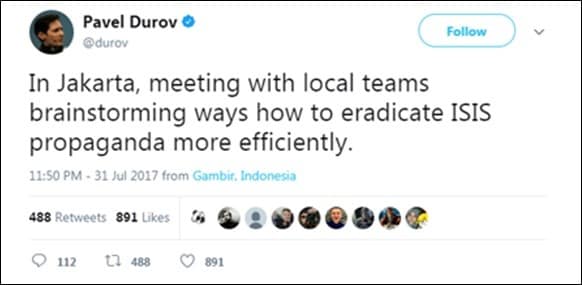
Given Telegram's and Durov's worldwide activity, the international community and bodies involved with fighting terrorist fundraising need to get involved and demand that Durov account for Telegram's links to terrorism – if necessary, via subpoena, including the U.N., E.U., and in Dubai, where Telegram says it is currently located.
Steven Stalinsky is the executive director of The Middle East Media Research Institute (MEMRI) and the author of American Traitor: The Rise and Fall of Al-Qaeda’s U.S. Born Leader Adam Gadahn.
[1] Popper, Nathaniel. "Virtual Currency Offerings May Hit a New Peak with Telegram Coin Sale," The New York Times, March 4, 2018.
[2] T.me/Eb_aa_Agency12/10146
[3] T.me/Eb_aa_Agency12/10198
[4] Engadget.com, February 5, 2018.
[5] Popper, Nathaniel. "Virtual Currency Offerings May Hit a New Peak with Telegram Coin Sale," The New York Times, March 4, 2018.
[6] Russell, Jon. "Telegram has raised an initial $850M for its billion-Dollar ICO," TechCrunch, February 17, 2018, www.techcrunch.com/2018/02/16/telegram-ico-850-million/.
[7] Sec.gov/Archives/edgar/data/1729650/000095017218000030/xslFormDX01/primary_doc.xml
[8] Fiabvi.vg/Documents/Principal-Legislation
[9] State.gov/j/inl/rls/nrcrpt/2016/vol2/253386.htm
[10] See Pub. L. 104-132, § 302, 110 Stat. 1214, 1248, 1250. See also section 219 of the Immigration and Nationality Act (8 U.S.C. § 1189), justice.gov/usam/criminal-resource-manual-16-providing-material-support-designated-terrorist-organizations
[11] Treasury.gov/resource-center/faqs/Sanctions/Pages/faq_other.aspx#cyber
[12] Executive Order 13694
[13] Un.org/counterterrorism/ctitf/en/countering-financing-terrorism
[14] Un.org/sc/ctc/focus-areas/financing-of-terrorism/




